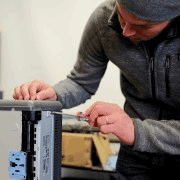BAN and Dell to track electronic scrap in a new pilot program
BAN and Dell to track electronic scrap in a new pilot program
<
The Seattle-based Basel Action Network (BAN) says it has partnered with Dell, Round Rock, Texas, on a new pilot project to use GPS trackers to verify where Dell electronic scrap goes once it is collected via the company’s U.S. consumer takeback programs.
Forty electronic devices containing hidden trackers will be send into Dell’s U.S. consumer disposition stream. Of these, Dell will deploy 30 directly and 10 will be provided to BAN to deploy independently. The goal of the pilot is to see if the devices end up where they are supposed to in accordance with the law and Dell’s strict no-export of e-scrap policy.
This collaboration marks the start of BAN’s new commercial EarthEye tracking service, which launches June 21 and is open to all companies and institutions. BAN has been developing the use of GPS trackers for the last decade, originally working with MIT’s SenseAble Cities Lab to follow cathode ray tubes into China from the U.S. via hidden smuggling routes from Vietnam. Today, with major programs conducted in Europe and North America and in cooperation with the United Nations in the Asia-Pacific Region, BAN says it is the global leader in tracking pathways of electronic scrap.
The inspiration for the Dell and BAN collaboration stems from BAN’s GPS tracking studies conducted two years ago. In 2016 as part of BAN’s e-Trash Transparency Project, BAN published a report titled “Disconnect: Goodwill and Dell, Exporting the Public’s e-Waste to Developing Countries.”
Today, the two organizations announced that they are working together to solve the problems identified in that report and to explore ways to improve accountability in waste management, BAN says.
“Given some lemons, Dell chose to make some lemonade,” says Jim Puckett, executive director of BAN. “We applaud Dell for their desire to step up and work with us to proactively get ahead of potential downstream accountability issues and to take action. In just a few days, we will be inviting all major corporations and institutions to do the same.”
]]>
Source: Recycling Today
BAN and Dell to track electronic scrap in a new pilot program
<
